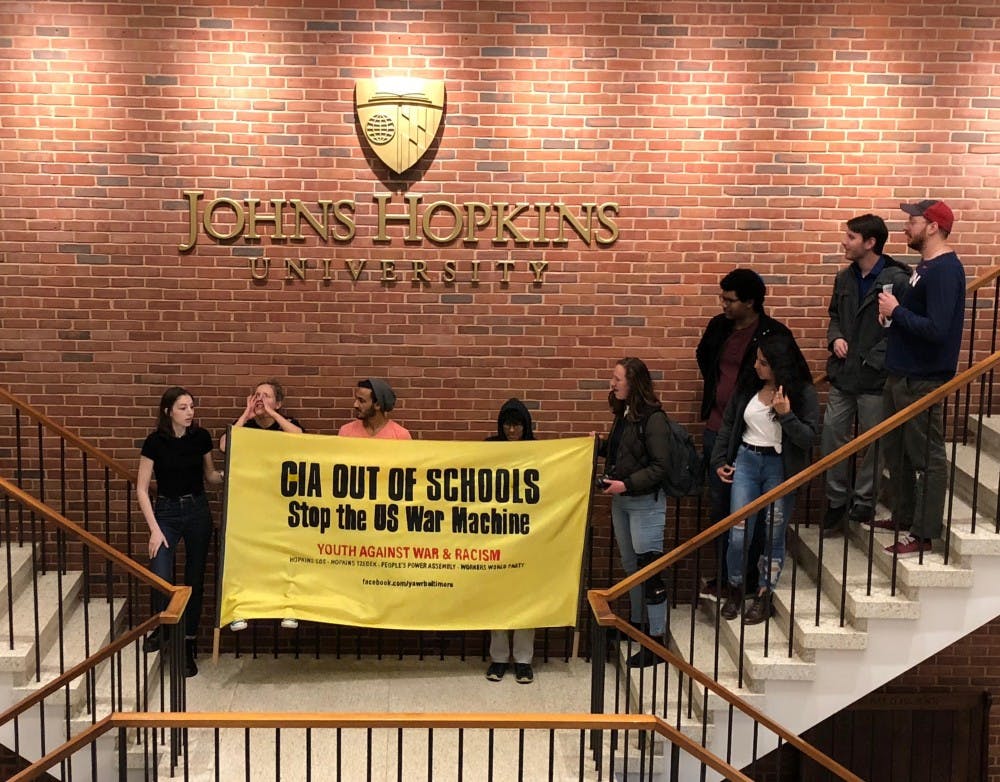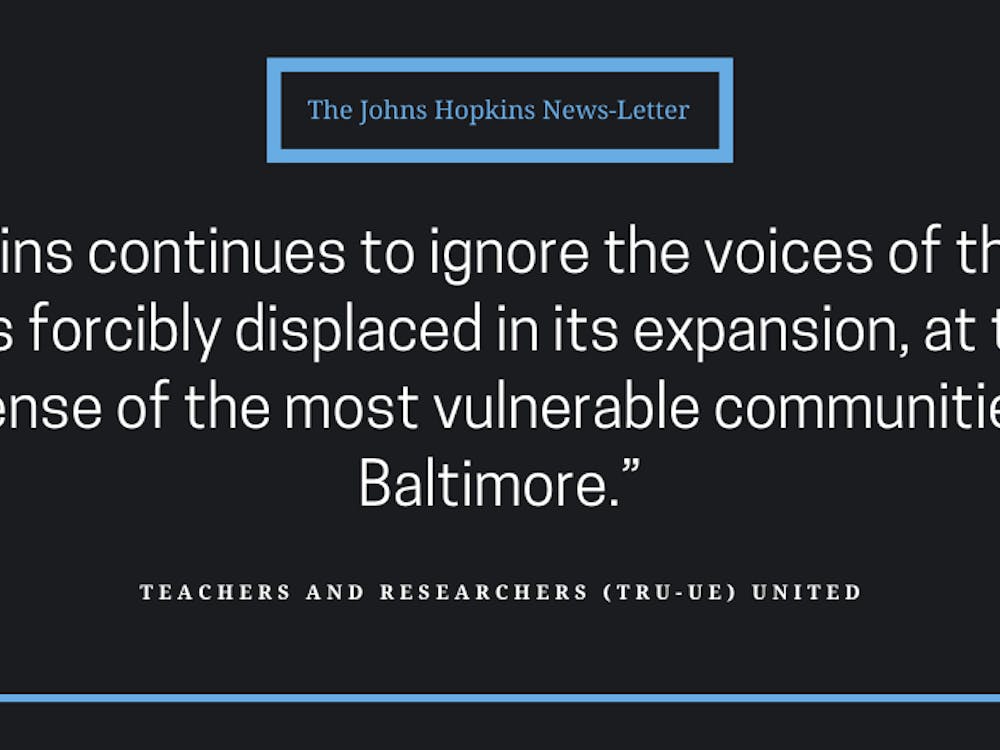A group of about 10 students staged a demonstration outside of a Central Intelligence Agency (CIA) recruiting event at the Career Center in Garland Hall on Tuesday. They partially blocked the entrance to the Career Center for about half an hour before marching out of Garland while condemning the University for inviting CIA representatives to campus.
Campus security responded to the protest, asking the demonstrators to move so that students could enter the Career Center for the information session. When the protesters moved aside, security officers stepped back and continued watching the group until it left Garland.
The protesters were members of Youth Against War and Racism, a coalition of advocacy groups including Students for a Democratic Society and Tzedek, as well as local organizations like the Peoples Power Assembly and the Workers World Party.
Senior Miranda Bachman, the founder of Tzedek and a leader of Youth Against War and Racism at Hopkins, explained that this demonstration was the first action that the coalition had taken.
According to Bachman, the coalition aims to oppose what she called “United States imperialism” in other countries. She explained that the coalition seeks to build anti-war sentiment in Baltimore and at Hopkins specifically.
“Young people need to lead the charge against U.S. war and U.S. imperialism,” she said. “The point of Youth Against War and Racism is bringing together students and young people in the city, around the city who will be engaged in the struggle.”
They held a banner reading “CIA Out of Schools, Stop the U.S. War Machine” and chanted slogans like “Hopkins Makes Nukes” and “How do you spell murderer? C-I-A.”
Freshman Bentley Addison, a member of Tzedek, said that the CIA was a fundamentally evil force. He explained why he thought it was important to oppose their presence on campus.
“We see the CIA coming to Johns Hopkins as a continuation of the school-to-war pipeline where really brilliant engineers and political scientists that graduate from Hopkins are recruited and snatched up by the CIA, by the FBI, by Homeland Security to create weapons of mass destruction that are going to be used in other countries,” Addison said.
Addison added that the protest was effective because they were heard by the Career Center and prevented some students from entering the recruiting event.
According to Julie Sanchez, the employer outreach coordinator at the Career Center, a career coach offered to speak with the demonstrators to hear their concerns about bringing representatives of the CIA to campus.
She added that she did not expect any protests when she coordinated the event but that she was impressed by how organized the group was.
“As long as we can make sure people can still come in and out of the Career Center, it’s their freedom of speech, and we’re not going to block that,” Sanchez said. “I’ve never had a protest before so it’s never really been an issue. We’ll just have to figure out some protocol on what happens and how we handle it.”
Zach Wheeler, a freshman who attended the information session, said that he wanted to learn more about the demonstrators’ cause.
“I don’t know if it’s an effective protest because I don’t know what they are standing for,” Wheeler said. “I’d like to talk to them.”
He added that the protesters were preventing students from learning more about the CIA to make an informed decision.
“If I were able to go to the information session, maybe I could learn more about the CIA and make an informed decision of whether or not I agree with their values and beliefs versus not going at all,” he said. “Blocking informed discussion is maybe not the correct way.”
Senior Kyra Meko, one of the protesters, said that they targeted the attendees of the recruitment session.
“It definitely made them think about it,” she said. “We sent a message to the University that there are students who don’t feel comfortable and who oppose having these agencies recruit on our campuses.”
She explained that the Applied Physics Lab (APL) has military contracts for research. Though much of the APL’s research is classified, Meko said that they work on weapons and drone engineering, as well as nuclear development.
According to Meko, it was important for them to persuade Hopkins students not to place their careers over the people who die as a result of the CIA’s efforts.
“For Hopkins students or for people who are considering doing these careers, it’s hard to connect getting a good job and people in other places dying,” she said. “With advanced technology of drones, you can kill someone so impersonally. You can be one cog in a machine that kills thousands of civilians, and you’re so removed from it that you don’t even know.”
Lieutenant Stephen Moffett of Campus Security, who shadowed the demonstration, said that the demonstration followed all of the protocols and guidelines for a demonstration on campus.
“Students have the complete right to express their concerns and protest as they see fit,” he said. “Our role here as far as security goes is just to ensure that everyone is safe and that no one is obstructed from attending the event.”
Bachman said that Youth Against War and Racism will stage a rally on May 5 to commemorate the 50th anniversary of the Catonsville Nine, when a group of clergy members broke into a draft office in Catonsville, Md. during the Vietnam War to burn draft cards.
She said that the demonstration went well and that protesters were very dedicated.
“The best way for people to learn and to become more political and to move more left and adopt more radical politics is through action,” she said. “We really ruffled some feathers and that was the goal. We stood tight, we stood together. We didn’t let anyone intimidate us.”
Bachman added that it’s important for students to be aware of what organizations are recruiting on campus.
“Pay attention to this. Get upset. It’s the students around us that are getting recruited and pulled into this war machine,” she said. “People don’t even necessarily know that when they do weapons research, that research is fueling the military overseas, bombing civilians, killing civilians, killing children in countries that do not have anywhere near the power and wealth of the U.S.”
Sarah Y. Kim contributed reporting.























Please note All comments are eligible for publication in The News-Letter.